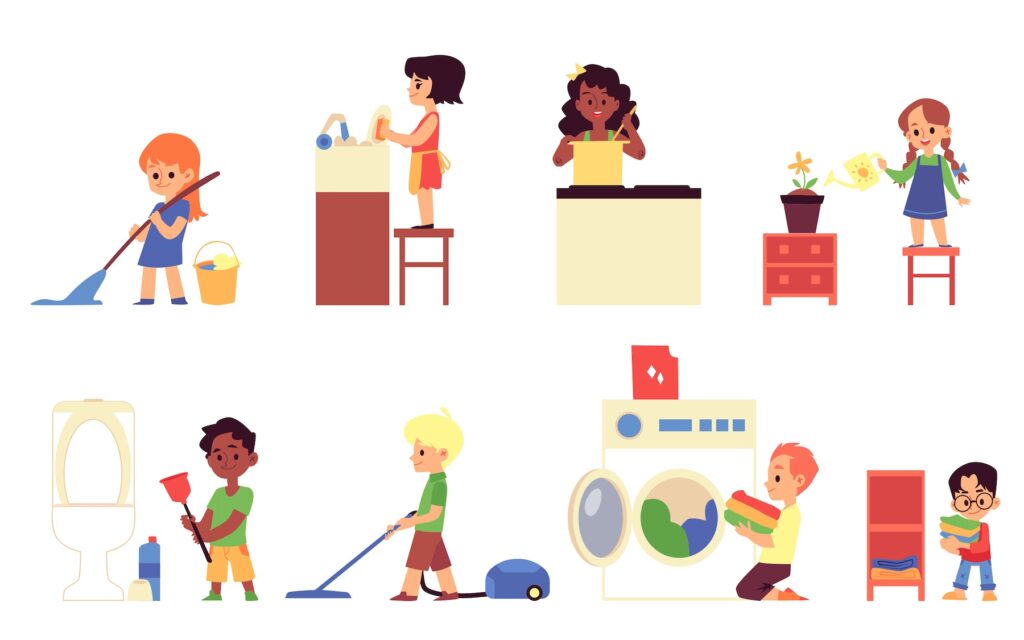
In the ongoing debate about whether children should do chores or not, opinions often diverge sharply. Some parents believe that chores are an essential part of a child’s upbringing, teaching them valuable life skills, responsibility, and discipline. In contrast, others argue that children should be free from these responsibilities, allowing them to focus on academics, extracurricular activities, and play. In this article, we’ll delve into both sides of the argument, exploring the benefits and drawbacks of assigning chores to children.
1. Why Children Should Do Chores
1.1. Responsibility and Discipline
One of the primary arguments in favor of children doing chores is the cultivation of responsibility and discipline. Assigning tasks such as making the bed, setting the table, or cleaning up their toys helps children understand the importance of completing their duties promptly and efficiently. This fosters a strong sense of accountability and discipline that can serve them well throughout their lives.
1.2. Life Skills Development
Chores offer a unique opportunity for children to develop crucial life skills. From doing laundry to cooking simple meals, children who engage in household tasks learn how to be self-sufficient and capable. These skills not only prepare them for adulthood but also boost their self-esteem, as they gain confidence in their ability to contribute to the family’s well-being.
1.3. Teamwork and Cooperation
Chores can also teach children the value of teamwork and cooperation. When they collaborate with siblings or parents to accomplish household tasks, they learn to communicate, compromise, and work harmoniously as a team. These social skills are invaluable in various aspects of life, including school, work, and relationships.
1.4. Time Management
Another benefit of children doing chores is the development of time management skills. Having specific tasks with deadlines helps children learn how to allocate their time efficiently. This ability can be particularly beneficial as they grow and face more demanding responsibilities, such as schoolwork and extracurricular activities.
2: Why Children Should Not Do Chores
2.1. Academic Focus
One argument against assigning chores to children is that it may distract them from their academic pursuits. Some parents believe that children should devote their time and energy to studying and achieving good grades. They worry that chores could take away valuable hours that could be spent on homework or educational activities.
2.2. Stress and Overburden
Critics of assigning chores to children argue that it can lead to stress and overburden. They believe that children already face a significant amount of stress due to academic pressures and extracurricular commitments. Adding household responsibilities to the mix can exacerbate stress levels, potentially leading to burnout and mental health issues.
2.3. Play and Creativity
Another perspective is that children should have the freedom to engage in play and creative activities without the constraints of chores. Play is essential for a child’s cognitive, emotional, and social development. Critics argue that assigning chores may limit a child’s opportunity to explore their creativity and imagination fully.
2.4. Quality Family Time
Some parents feel that assigning chores may detract from quality family time. They believe that children should have more time to bond with their parents and siblings, creating lasting memories and nurturing strong family connections. Chores can potentially take away from these precious moments.
3: Finding a Balanced Approach
3.1. Balancing Chores and Responsibilities
The debate between whether children should or shouldn’t do chores need not be absolute. Instead, parents can find a balanced approach that takes into consideration the child’s age, temperament, and other commitments. Assigning age-appropriate chores with manageable expectations can help children learn responsibility without overwhelming them.
3.2. Communication and Flexibility
Effective communication is key to a harmonious household. Parents should engage in open dialogues with their children about the importance of chores, their benefits, and how they fit into the family dynamic. Being flexible and willing to adjust chores based on a child’s schedule or needs can also create a positive and cooperative atmosphere.
Conclusion
In the ongoing debate over whether children should do chores, both sides have valid points. Assigning chores can instill responsibility, discipline, life skills, and teamwork in children. However, it may also affect academic focus, increase stress, limit play and creativity, and potentially reduce quality family time. Finding a balanced approach that considers the child’s individual needs and circumstances is crucial.
Ultimately, the decision should be based on what works best for the child and the family as a whole. Regardless of the choice made, effective communication, flexibility, and understanding should guide the way. By keeping these factors in mind, parents can ensure that their children grow up to be responsible, well-rounded individuals while enjoying a fulfilling childhood.
